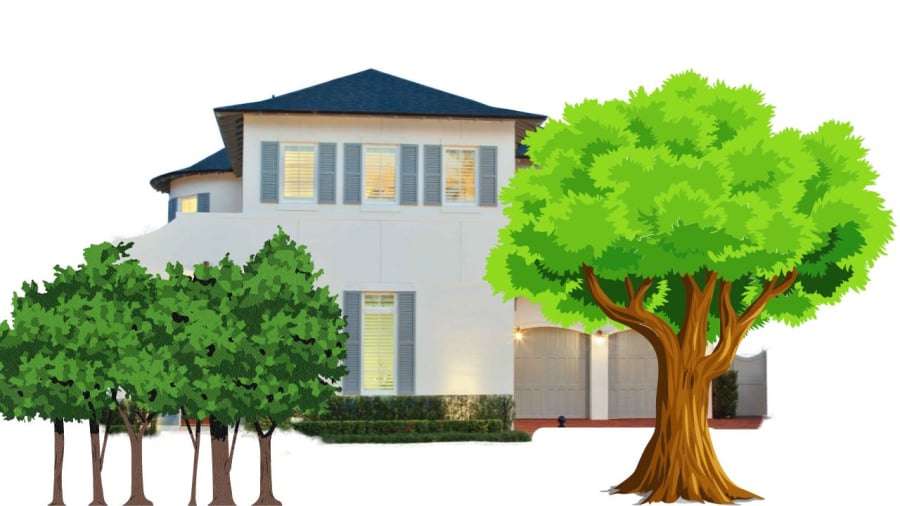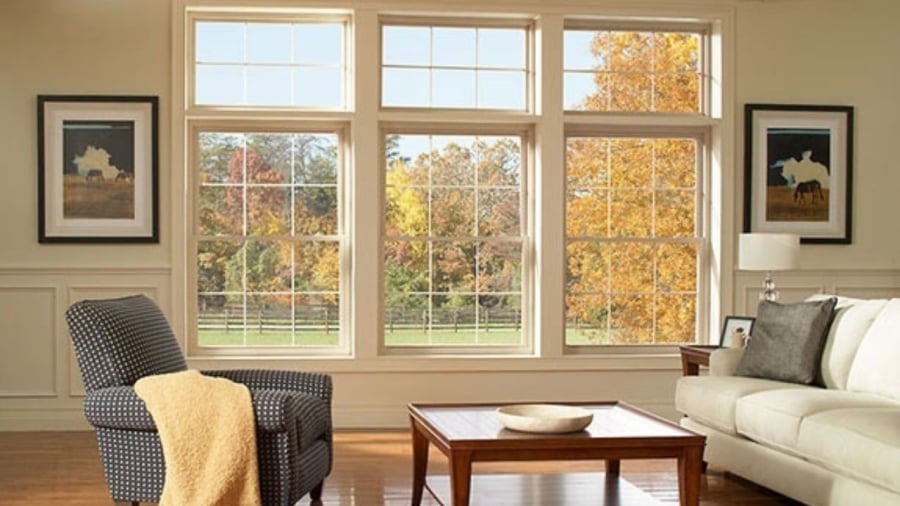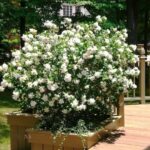What about planting large trees in front of the house?
Large trees provide shade and can be a source of wood. While our ancestors lived in close harmony with nature, they were cautious of having large trees directly in front of their homes.
The concern arises from the potential for these trees to cast an ominous shadow over the house, bringing an air of gloom. Additionally, there is a risk of branches breaking and falling during storms, causing damage to the house and even injuring residents. Falling branches can also strike and damage the roof, leading to costly repairs.

Large trees obstruct the view
Furthermore, large trees can serve as a dwelling for supernatural entities, which may bring negative influences into the home. From a practical standpoint, these trees can block sunlight and fresh air from entering the house, potentially leading to health issues for the occupants.
In terms of feng shui, having a large tree directly in front of the house is considered unfavorable as it blocks the path of wealth and prosperity from entering the home.
What about windows at the back of the house?
In the past, houses were typically built facing south, which meant that the back of the house would face north. Opening windows on the north side invited cold winds, making the house chilly and uncomfortable, affecting sleep and potentially causing illnesses.
In ancient times, people relied solely on natural heating, without the modern conveniences of central heating. As a result, opening windows on the north side of the house, especially during colder months, could lead to a significant decrease in indoor temperature, causing discomfort and health issues.
From a spiritual perspective, windows at the back of the house are believed to drain wealth and prosperity. Money that comes in through the front door is thought to exit through the back, particularly if the back window directly aligns with the front entrance. For this reason, our ancestors avoided placing windows at the back of their homes to maintain positive feng shui.
Our ancestors also valued privacy and discretion, especially in households with daughters. Windows at the back of the house could invite unwanted attention, providing an opportunity for thieves and creating a space for clandestine meetings between young men and women, which was considered improper.
Therefore, when building a house, our forebears believed it was best to avoid placing windows at the back. Instead, in traditional horizontal-style houses, windows were often placed on the sides to allow for ventilation without compromising privacy.

Windows at the back of the house can impact daily life
Is this belief still relevant today?
Times have changed, and so has architectural design. Today, houses are often built facing east, west, or north, and the orientation of the front facade is considered more important than strict adherence to traditional directions. As a result, the placement of windows at the back of the house is no longer dictated by the same constraints as in the past.
Modern houses also come in various styles, including vertical constructions, which differ from the traditional horizontal layout. In these newer designs, windows at the back of the house are often necessary to ensure proper ventilation and natural lighting.
However, from a feng shui perspective, it is still important to consider a few guidelines: the back window should not be larger than the front one, and it should not directly align with the front entrance. Additionally, it is best to avoid placing windows directly above the cooking area, as this can impact both the cooking process and the feng shui of the space.
Large trees in front of a house can be aesthetically displeasing, especially for businesses, as they obstruct the view and entrance. Therefore, it is generally advisable to refrain from planting large trees directly in front of a house. Instead, opt for smaller trees that provide a pleasant aesthetic without causing potential issues. During stormy seasons, large trees with shallow roots and brittle branches can also cause anxiety for homeowners, posing a safety risk.
Information based on personal experiences and observations
The Ultimate Guide to Feng Shui Trees for Wood Element: Enhancing Your Home, Your Style, and Inviting Prosperity
Are you a believer in the power of Feng Shui and seeking plants that will bring good fortune and prosperity? Do you wish to transform your living space into a vibrant and refreshing oasis? Then look no further than these carefully curated Feng Shui plants that are sure to bring positive energy and harmony to your home or office.





































